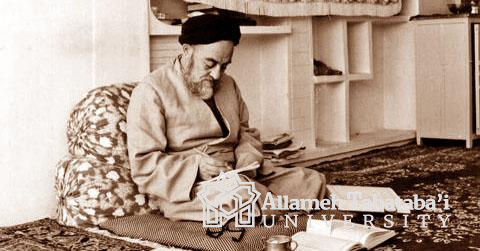Allameh Tabatabai and Another Prominent Iranian Figure Registered with UNESCO

Report by Directorate for International Academic Cooperation, Allameh Tabataba'i University, Tehran—
Report prepared in English by Rasoul Firouzi
According to ATU Public Relations, the prominent Iranian figures "Bayazid Bastami" and "Allameh Tabataba'i" were registered on the UNESCO list of commemorations for the 2026-2027 period following the proposal of the Iranian National Commission for UNESCO and the approval of the General Conference.
Based on the UNESCO resolution, the "1150th anniversary of the passing of Bayazid Bastami," as a teacher of Islamic mysticism, was approved with the support of Armenia, Tajikistan, and Turkey. Also approved was the "100th anniversary of the active scholarly life of Allameh Tabataba'i," with an emphasis on his enduring work, The Principles of Philosophy and the Method of Realism, with the support of the Republic of Azerbaijan, Iraq, and Pakistan.
The decision was made on Saturday, 1 November 2025, during the second session of the UNESCO Foreign Relations Commission at the 43rd UNESCO General Conference. The programs of the UNESCO General Conference in Samarkand were attended by Hossein Simaei, Minister of Science, Research and Technology and President of the Iranian National Commission for UNESCO, and Hassan Fartousi, Secretary-General of the National Commission.
The Iranian National Commission for UNESCO announced: "To this end, and to continue the introduction and celebration of these two enduring figures, cultural and scientific events will be held at national and international levels."
A section of the proposal by the Iranian National Commission for UNESCO states:
"Despite his traditional upbringing, Allameh Tabataba'i emphasized reason and argumentation in philosophy and approached Islamic philosophy with a creative and transnational perspective. His prominent work, The Principles of Philosophy and the Method of Realism, comprises 14 philosophical articles in which he established a link between Islamic philosophy and modern Western philosophy. This work is considered one of the most significant steps in creating a dialogue between Eastern and Western thought.
The proposal further emphasizes that "Allameh Tabataba'i built a bridge between Islamic and Western philosophy and, with a comparative and dialogue-oriented approach, provided the groundwork for mutual understanding between cultures. His meetings and discussions with the French philosopher Henry Corbin played a decisive role in introducing Islamic thought in Western philosophical circles."
"Allameh Tabataba'i is not only one of the greatest interpreters of the Holy Quran, but is also considered a global and cross-cultural figure in philosophy whose thought is based on dialogue, rationality, and the connection of cultures—concepts that continue to hold a special place in philosophy and international cultural relations today."
Also, in the introduction of Bayazid Bastami as a teacher of coexistence, tolerance, and peace, the proposal from the Iranian National Commission for UNESCO states:
"Bayazid Bastami (Abu Yazid Tayfur ibn Isa, born circa 180 AH / 803 CE in Bastam, Semnan) is one of the greatest mystics and pioneers of Iranian Sufism, who became famous by the title Sultan al-Arifin (Sultan of the Gnostics) due to his exalted status in Islamic mysticism. He dedicated his life to spreading knowledge, ethics, and spiritual conduct, and trained many disciples from various lands such as Iran, Iraq, India, Turkey, and Central Asia.
In his teachings, Bayazid emphasized love for humanity, respect for nature, and the value of science and knowledge. He considered knowledge the most beautiful divine gift and believed that a person should be either learning or teaching throughout their life. This perspective aligns with the concept of 'lifelong learning' promoted by UNESCO today."
The Islamic Republic of Iran also played an effective and active role in the inscription of commemorations for three other luminaries of the Islamic world and the Iranian cultural sphere, including "Rabe'eh Balkhi" in a joint proposal with Tajikistan, "Ayatollah Mohammad Baqir al-Sadr" from Iraq, and "Baki" (the poet) from Turkey.
According to the resolution, the 1050th birth anniversary of Rabe'eh Balkhi (976 CE) was included on the list of commemorations as a joint proposal by Tajikistan, Afghanistan, and Iran (with the support of Belarus and Kyrgyzstan); the 50th anniversary of the book The Logical Foundations of Induction by Grand Ayatollah Sayyid Muhammad Baqir al-Sadr (1976) was included as a proposal by Iraq with the support of multiple countries including Iran, Japan, India, and Russia; and the 500th birth anniversary of the Turkish poet Baki (with the support of North Macedonia and Iran) was also included.


